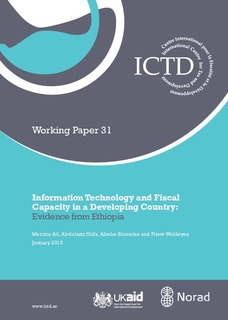Information Technology and Fiscal Capacity in a Developing Country: Evidence from Ethiopia
Research report

Permanent lenke
http://hdl.handle.net/11250/2475259Utgivelsesdato
2015-02-01Metadata
Vis full innførselSamlinger
- Publications [1488]
Originalversjon
(ICTD Working Paper no. 31)Sammendrag
Governments in developing countries are typically constrained by a limited fiscal capacity to finance the provision of essential public goods – a constraint that has been cited as one of the fundamental challenges to economic development. Several developing countries have recently implemented electronic tax systems (ETS) to improve monitoring tax compliance using modern information technology (such as electronic sales registry machines (ESRMs). Despite the widespread adoption of ETS throughout the developing world, there is a dearthof systematic evidence on its impact. In this paper, we document the impact of ETS using quasi-experimental evidence from Ethiopia – a low-income country in Sub-Saharan Africa which expanded use of ESRMs in recent years. We use administrative data covering the entire set of those registered for Value Added Tax (VAT) in Ethiopia. We find that ETS resulted in a large and significant increase in VAT payments (of about 20 log points). We also find evidence that the effect is driven primarily by firms that are more likely to evade taxes prior to ETS adoption, suggesting that ETS has minimised tax evasion.